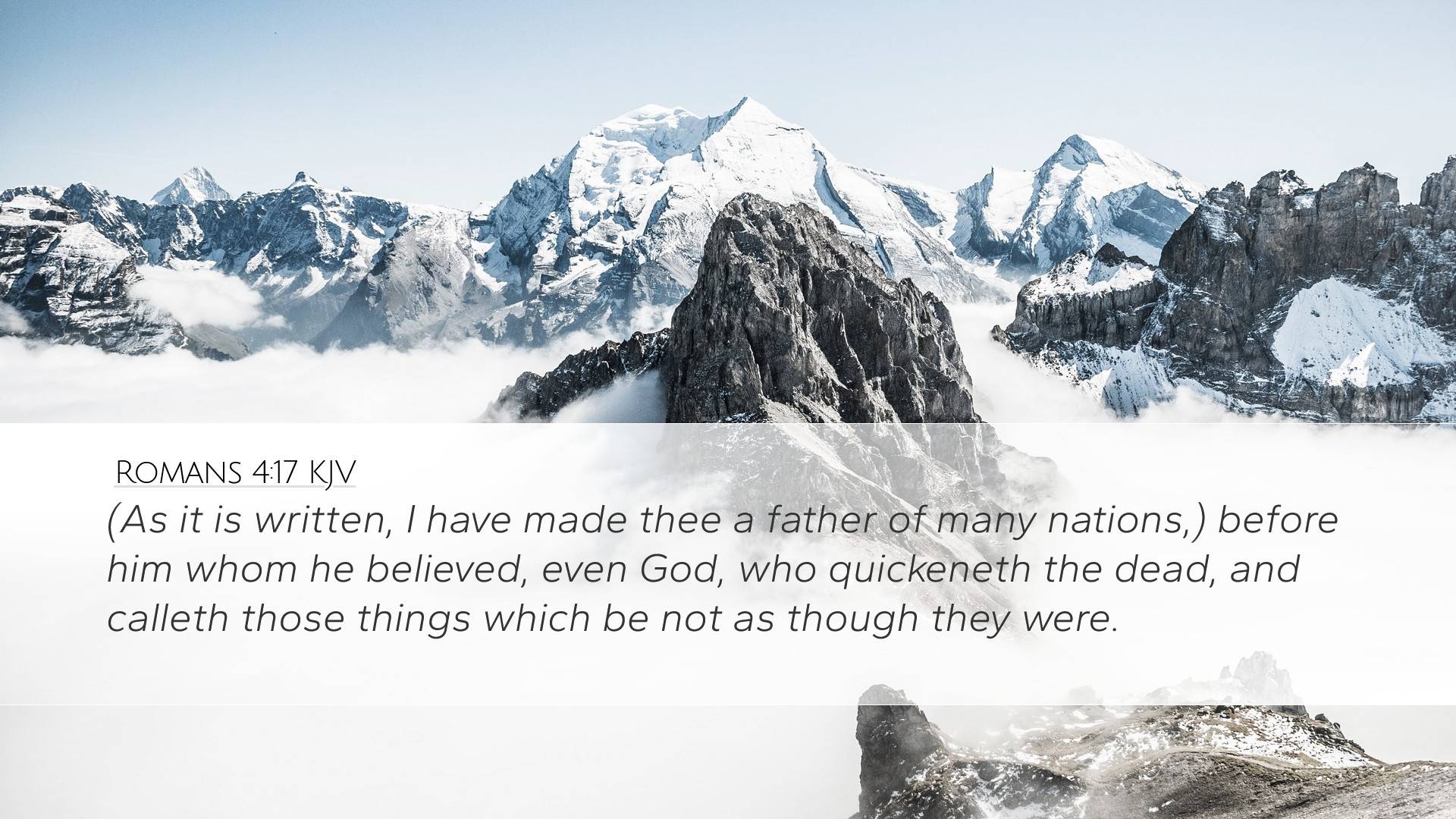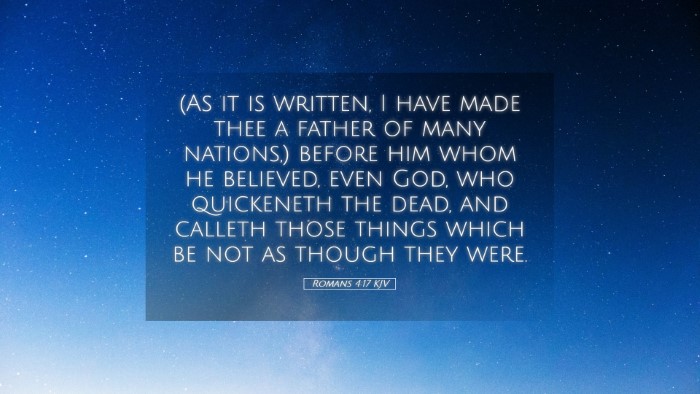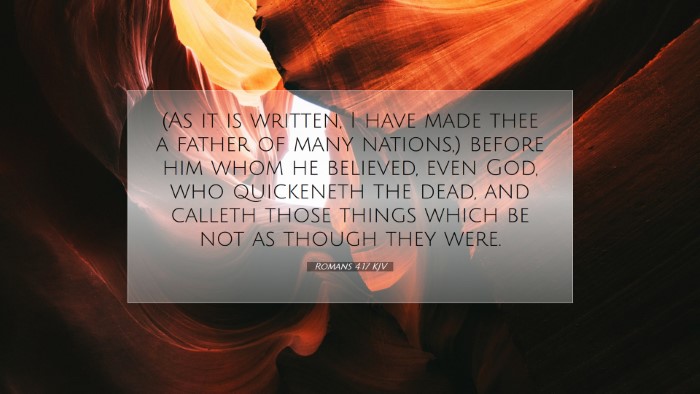Old Testament
Genesis Exodus Leviticus Numbers Deuteronomy Joshua Judges Ruth 1 Samuel 2 Samuel 1 Kings 2 Kings 1 Chronicles 2 Chronicles Ezra Nehemiah Esther Job Psalms Proverbs Ecclesiastes Song of Solomon Isaiah Jeremiah Lamentations Ezekiel Daniel Hosea Joel Amos Obadiah Jonah Micah Nahum Habakkuk Zephaniah Haggai Zechariah MalachiRomans 4:17
Romans 4:17 KJV
(As it is written, I have made thee a father of many nations,) before him whom he believed, even God, who quickeneth the dead, and calleth those things which be not as though they were.
Romans 4:17 Bible Commentary
Commentary on Romans 4:17
Verse (Romans 4:17): “As it is written, I have made you the father of many nations— in the presence of the God in whom he believed, who gives life to the dead and calls into existence the things that do not exist.”
Introduction
This verse serves as a profound declaration of faith and divine promise, encapsulating the essence of God's ability to bring forth life and reality from the void. It reflects on the life of Abraham, emphasizing his role as a patriarch and father to nations by faith. This commentary will explore the theological implications of this verse, drawing insights from esteemed public domain commentaries by Matthew Henry, Albert Barnes, and Adam Clarke.
The Context of the Verse
Understanding Romans 4:17 requires a look at its context within the epistle. The Apostle Paul is discussing justification by faith and highlighting Abraham as the father of the faithful. His faith was counted as righteousness not through works but through belief in God's promises, which emphasizes the central theme of grace.
The Significance of "Father of Many Nations"
Paul quotes Genesis 17:5 where God changed Abram's name to Abraham, signifying his role as the father of a multitude. This was not merely a reference to physical descendants but extended to spiritual heirs, as Paul later addresses in Galatians 3:7-9, where he asserts that those of faith are the children of Abraham.
- Matthew Henry: He emphasizes that Abraham's faith lay not in the visible but in the faithfulness of God, affirming that God’s promise to bless nations through him reached beyond Israel to all who believe.
- Albert Barnes: Barnes notes that this promise to Abraham portrays God's intent to create a diverse family of faith— correlating to the fulfillment through Christ, where people from every nation could be reconciled.
- Adam Clarke: Clarke expounds on the term used in this context, explaining that it highlights not only physical lineage but also the spiritual impact of Abraham’s faith that has repercussions through generations.
The Role of God in Calling into Existence
The latter part of the verse speaks to God's omnipotence, stating that He gives life to the dead and calls things that do not exist into being. This aspect is crucial for understanding not only Abraham's story but also the nature of God Himself.
- Matthew Henry: He points out that God’s power is not confined to human limitations. Just as He called light from darkness in creation, so too does He summon faith and life from obscurity.
- Albert Barnes: Barnes comments on the transformative power of God’s word and promise, suggesting that what appears impossible for humans is fully achievable by God’s sovereign decree.
- Adam Clarke: According to Clarke, this divine ability underscores a core of Christian belief: God brings about salvation and life from the spiritual death in which humanity lies due to sin.
The Faith of Abraham
The verse encapsulates the essence of Abraham's faith. He trusted in God's promise despite the apparent impossibilities. His belief was not rooted in what was visible but in what God had declared.
- Matthew Henry: Henry articulates that genuine faith believes beyond what can be seen or comprehended, exemplified in Abraham who chose to trust God's promise for a son despite his old age.
- Albert Barnes: Barnes enhances this with a practical application, emphasizing how believers today must adopt a similar faith stance—believing in God’s promises that align with His word.
- Adam Clarke: Clarke encourages readers to understand where doubt may arise—through hardships, delays, or profound challenges—and to nevertheless hold fast to faith in the God who revives the dead.
Theological Implications
This verse richly contributes to several theological areas:
- Grace and Justification: The promise to Abraham becomes the foundation for understanding grace. Justification comes through faith, reiterating that it is God who fulfills His covenant, not human effort.
- The Nature of God: God’s ability to create life from nothing affirms His sovereignty and authority over creation. This becomes a fundamental aspect of Christ’s resurrection and the believer’s new birth.
- Faith and Promise: The linkage between faith and the promises of God is further expounded in this scripture, enabling believers to look forward in hope regardless of circumstances.
Conclusion
Romans 4:17 serves as an extraordinary reminder of the depth of God's promises and the nature of faith. Through Abraham's example, believers find not only hope but also encouragement to trust in the power of God who calls forth life and reality. This verse is a testament to the profound relationship between faith, promises, and the nature of God, making it a rich source of reflection for pastors, students, theologians, and Bible scholars alike.


